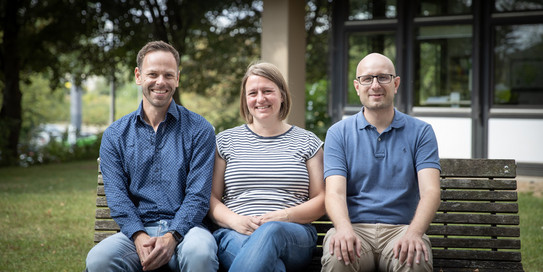"Research data management should be practiced from the beginning"

Stefan Schmidt and Anne Pferdekämper-Schmidt, project coordinators of DoProfiL, the "Dortmund Profile for Inclusion-Oriented Teacher Education", have developed and implemented a joint research data management in the current project. This was necessary because the Federal Ministry of Education and Research (BMBF), as the funding agency, has imposed new requirements for handling research data. Together with Sven Anderson, who is a researcher in DoProfiL, they report how they went from being novices in research data management to data champions and how they use the Research Data Management Organizer (RDMO) to create data management plans.
The BMBF has specific requirements for dealing with research data. In your view, what was the greatest challenge in this regard, and what offerings from TU Dortmund supported you in this?
Schmidt: It wasn't until we received the notification of funding in 2019 that we were informed that we were obligated to perform data management. We had not thought about this beforehand. It was therefore a great challenge to introduce collaborative research data management for such a heterogeneous project. We quickly realized that we needed a supporting tool for data management planning. After a workshop on RDMO by the TU Dortmund University Research Data Service, we started to create data management plans with this tool. Since DoProfiL was already running at that time, it was sometimes difficult for researchers to retroactively prepare how to handle research data. It would have been easier and better if we had started immediately at the start of the project.
Pferdekämper-Schmidt: We noticed that some of the predefined questions about data handling in RDMO were not answered because the researchers either couldn't do anything with them or hadn't yet thought about individual aspects such as reuse. Dr. Kathrin Höhner from the Research Data Service therefore trained me in data management and so I was able to pass on my knowledge to the researchers and help clarify things. Although we did this in an ongoing project, it worked surprisingly well. But ideally, all researchers should already be trained on this at the start of the project.
How did data management plans help to develop a practice-oriented, yet common and uniform data management in an interdisciplinary project like DoProfiL?
Schmidt: Other than specifying a mandatory data management plan based on our own RDMO template, we did not homogenize data management across subprojects; that was not our goal at all. But by linking the submission of the data management plan to the annual interim reports, we can make the data management of each subproject traceable - and take into account that theory papers or empirical papers differ significantly in their data management. Thanks to RDMO, we know at the end of each subproject where the data are stored and who the specific contact person is. This means that no data is lost, and even years later it can be easily retrieved and retraced.
Pferdekämper-Schmidt: RDMO can take into account the diversity of subject cultures because it is a flexible and iterative tool. That's helpful because, after all, a data management plan is not set in stone. RDMO helps document how research data is being handled, as well as identify open tasks and keep time markers in mind. Issues that are not yet relevant to a project (e.g., long-term archiving) can also be skipped. As soon as the topic becomes relevant, the information can be added. As a tool, RDMO is very adaptable, but also demanding, which is why targeted training measures make sense.
To what extent has the use of RDMO changed the way you handle research data as a researcher?
Anderson: RDMO, because of the specific questions and fill-in-the-blank guides, offers the opportunity to engage intensively with data handling during project planning and early on. I think that the RDMO tool will be helpful for researchers in the future when they are planning a third-party funded project, for example, because it makes them aware of relevant issues, such as storage, ethics application or data protection, even before they submit their application. It is also helpful for collaborative work with project partners and facilitates the subsequent use and publication of data because it is carefully and transparently documented. In a few years, third parties will therefore still be able to understand how a data collection was carried out.
About the persons:
- Stefan Schmidt is project coordinator of DoProfiL and responsible for the coordination and technical management of LabprofiL (Laboratory for Research-Based and Inclusion-Oriented Teacher Education).
- Anne Pferdekämper-Schmidt was also involved in the project coordination of DoProfiL from 2021 to 2022 and was heavily involved in research data management. Since July, she has been based in the area of disability and studies (zhb, DoBuS) and works in the "Kompetenzzentrum digitale Barrierefreiheit.nrw".
- Sven Anderson is a research associate in the DoProfiL project and based in the Faculty of Rehabilitation Sciences in the subject areas of vision, visual impairment & blindness, and development and research of inclusive educational processes. He conducts research in DoProfiL on the development of adaptive learning situations and learning trajectory diagnostics
Further information:

